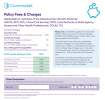Compounding
New Member
- Messages
- 3
I joined the CS in 2018, and by 66 (currently in mid 30s) I will have the full forty years. I'm looking at setting up an AVC. My preliminary query is regarding overfunding. Am I right in saying that as my pension will be based on average career salary, it is very unlikely that I will overfund?
Secondly, I have been dealing with Cornmarket, and I am wary of the fees. They are outlined as below: €595 "consultancy fee", 0% contribution charge for regular contributions (which I will be doing), 4% contribution charge for each single premium contribution.
The AMC is 1%, which is then tiered as funds increased and they have advertised the fund fees are "expected to total between 0.1% - 0.2% each year". Image re fees below.
My question is whether there is much I can save by pursuing other options - while not having to claim the tax relief myself by having it all done through my payslip is handy, I am prepared to claim from revenue myself if there is a meaningful saving to be found elsewhere. Any help or pointers much appreciated - in particular discussion re the AMC fees in this example compared to others would be much appreciated.

Secondly, I have been dealing with Cornmarket, and I am wary of the fees. They are outlined as below: €595 "consultancy fee", 0% contribution charge for regular contributions (which I will be doing), 4% contribution charge for each single premium contribution.
The AMC is 1%, which is then tiered as funds increased and they have advertised the fund fees are "expected to total between 0.1% - 0.2% each year". Image re fees below.
My question is whether there is much I can save by pursuing other options - while not having to claim the tax relief myself by having it all done through my payslip is handy, I am prepared to claim from revenue myself if there is a meaningful saving to be found elsewhere. Any help or pointers much appreciated - in particular discussion re the AMC fees in this example compared to others would be much appreciated.


